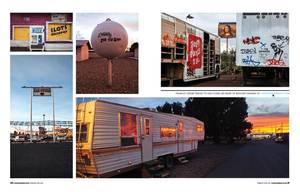Matthias Galica flew to Las Vegas for an answer. He hoped being in the same city, in the same coffeeshops, seeing the same people that Jody Sherman saw would provide some solace, resolve the question that had dogged him for more than a week:
Why?
Sherman was a friend, mentor and fellow techie Galica could rely upon to talk through issues that arise within the world of tech startups.
“He had that ability to see something in you …” Galica says, trailing off. “It’s just that, we were both kindred spirits, both mischievous and fun-loving. And he was so f*cking smart.”
Sherman took his own life on January 28.
At the counter of the Beat coffeehouse, Galica’s dark-rimmed glasses and curly, yellow-dyed hair reveal the youth beneath his furrowed brows and dark-circled eyes. He’s 28 but says he “feels old” among the “youngsters” in the tech startup community. He’s been working a few years on an app that has become Beastmode.FM, described as “a music discovery platform built around top music bloggers.”
Sherman was a friend and someone who always listened and didn’t judge. “It wasn’t like he’d done it 10 years ago and quit; he was doing everything step-by-step like me, doing what I was doing,” Galica says, his eyes welling with tears. “I don’t have anyone like him anymore.”
When someone like that dies, the loss is great. When it’s suicide, it’s a sock to the gut that leaves you gasping for breath.
Galica works in LA, and Sherman was well-known in the tech community there before moving Ecomom.com here about a year ago. He was one of the first to buy into Downtown Las Vegas as a hub for startups.
Though no one knows why Sherman killed himself, a few days after his death Ecomom’s board of directors laid off 17 employees. They still employ 13, including four in Las Vegas, and via email, a company spokesman said, “There are financial stressors on the business,” and that the restructuring occurred so Ecomom “may continue to be a place parents rely on.”
According to Ecomom’s website, the company provides “eco-friendly and organic products to moms who desire an eco-conscious lifestyle for themselves and their children.” Last October, Sherman told me that the company had grown 300 percent since moving to Vegas, but there was likely more that he couldn’t or wouldn’t say.
While that’s not unusual for business owners, Galica says the code of silence seems especially strict among tech startups.
Galica has had his share of setbacks already. He’s gone months without being able to pay his friends/co-workers after investments dried up, and he’s felt the pressure of satisfying those who do invest.
“Because the investor isn’t investing in an idea, really. He’s investing in you. And I want to make them proud and want to succeed,” Galica says. “That’s the nature of a lot of us who get into this; you’ve got that drive and you hate failing.”
He vacillates between a sense of pride that his friends have stuck with him and despair at not being able to pay them. “These have been the hardest couple years of my life; I’ve been tested in this crucible. I guess you come out stronger and more refined, but I’ve had dark, dark moments.”
And Galica doesn’t wonder if other people have the same doubts; he knows they do. Maybe even Sherman.
Startups do not have a high probability of success. According to Shikhar Ghosh, a senior lecturer at Harvard Business School, roughly 75 percent of all venture capital-funded startups fail to reach revenue goals. Yet in the three years Galica has been in the business, “I have never heard one person say, ‘This thing is going bad; I need to talk about it,’” he says. “You always put on a happy face, and smiles and shaking hands, and it’s a show. You go to talks and you hear everyone’s raising money … and it kind of contributes to the hysteria. You wonder, ‘What am I doing wrong?’ Sometimes it’s an echo chamber in the worst possible way.”
Joe Downtown
Galica isn’t alone. Thomas Knoll is the founder and CEO of Clipppr.com and a curator of the online newsletter Startup Digest, and he likens the startup cycle to “a bipolar experience.”
“The highs are so high and the lows are so low, and you’re not really allowed to be unhappy,” Knoll says. “You see what happened with Jody. He had a great company, got to travel and you believe those things will make you happy. So if it can happen to him, what does that mean about me? Am I even happy? When was the last time I told someone I’m scared or frustrated about the business?”
Starting a business, he adds, is like “raising a child.” You spend so much time and effort helping it grow, it virtually becomes part of your being.
“But because this is business, we’re supposed to be able to separate that from our emotions. Maybe that’s considered part of the masculine nature of the work, but we’re human.”
Knoll is toying with the idea of a website to connect startup founders with those who have been through the struggle—people who aren’t investors and might be more worried about getting a return on their investment. Galica says he wants to do something similar; he and Knoll are going to talk about it.
“It would be something like a Startups Anonymous, though obviously not called that,” he says.
Having talked it out, Galica seems a little more chipper. It’s about noon at the Beat and he stands up to stretch. When he turns around, he suddenly smiles big.
His sister from Washington, D.C., is sitting at a table. She was worried about him, so she flew to Las Vegas that morning. A little while later, another pleasant surprise: His mother has flown in from Chicago, as well.
Galica may never know why Sherman killed himself, but he knows the stresses of the startup industry can eat away at the soul. If he can do something, even in a small way, to ease that burden, that’s his aim.
“We need to institutionalize some kind of support mechanism,” he says. “Jody was a mentor’s mentor. Maybe over time, we can create more people like him to help all of us.”









Previous Discussion: